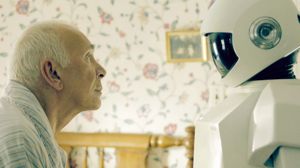Are you surprised? Writing to the person responsible for any kind vegetation used on a movie set, might seem an odd choice for a movie like Robot & Frank, which is set in the "near future," (as the film describes it). It's usually other crew members, like the futurists, concept designers, or effects people who take on responsibility for realizing a fantasy world. Thankfully, this future vision is made up of small distinctions from our present time. Mostly things are smaller (cars that are half the size of current Smart cars, cellphones are made of a single pane of glass, even micro-loans have evolved to nano-loans). Your work, though, and the care that it requires, represents the best of this little movie, which thrives despite some weedy patches.
Frank, played by the reliably strong Frank Langella, is a man growing old by himself who has begun suffering memory loss, which makes it difficult for him to do the one thing he loves the most: break into people's homes and steal. He's a mostly-retired (they're never really retire, do they?) cat burglar. Living by himself in a house on the outskirts of an unnamed town, Frank spends his days walking into town, flirting with the librarian (Susan Sarandon), and engaging in some minor shoplifting. The memory loss, however, is becoming more pronounced--to the point that one of his grown sons, Hunter (James Marsden), decides that Frank needs a helper to not only take physical care of Frank and his house, but to also establish a routine and diet that will at least slow the memory loss. Enter Robot.
One of Robot's main activities for Frank falls squarely into your artistic domain: gardening. It (Robot has a male voice provided by Peter Saarsgard, but is always referred to as an 'it') digs up a patch in the lawn, and plants some garden vegetables: tomatoes, cucumbers, etc. And as this garden flourishes--even with Frank's indifference to Robot and its urge to contribute--Frank's mental state begins to improve. Now this isn't tied to the garden directly, as Robot also has Frank eating better (steamed vegetables equal more greenery), and doing more physical activity; but the continued shots of Robot watering and tending to the garden, as well as the growth of the plants themselves, line up with Frank's return to a version of his old self.
Robot's gardening routine does grow on Frank over time. As you must very well know, gardening is often used as a metaphor for renewal, and here it does some of that work.* Robot's diligence, along with the budding plats, eventually inspire Frank to do something more: return to stealing. In Robot, Frank has found the perfect partner: emotionally uninvolved, but proficient at a level no human could ever achieve. The central, and best, parts of the film detail Frank and Robot planning some new heists - just the type of project, Frank argues, that keeps an old mind sharp. The deadpan, flat readings of Saarsgard play against Langella's gruff but vulnerable Frank.
*Although this is not a tied-directly-to-the-plot-to-the-point-of-telling-the-story use of that metaphor like it was in E.T. The Extra Terrestrial, successful as it was in that film.
If only everything in the film was tended to with as much care as well as this central relationship. Liv Tyler's Madison, Frank's daughter, speaks of the inequality created by treating robots as slaves, but this idea seems trimmed before it has time to bear any fruit. Major characters played by Jeremy Strong and Jeremy Sisto are only partly realized, relying on the actors to grow something in the infertile soil of Christopher D. Ford's script. (Sisto is more successful, adding some comic line readings that make his Sherriff more of a rounded human than he must have appeared on paper; Strong's creation comes off as and effete mashup of Tim Burton and Atom Egoyan.) And some late film character revelations feel false when compared with earlier actions. But, like the circular shape of the garden you helped create for the files, Robot & Frank does return back to its strengths just enough to make it work overall. And your lovely garden manages to play a central role in the closing moments.
Does all of this add up to a profound, circle of life-type statement? In a word, no. But that's okay. Robot & Frank's goals aren't that high. It's content to do just enough work to let one flower bloom, even if other buds have to be discarded along the way.
Rakishly yours,
Casey






